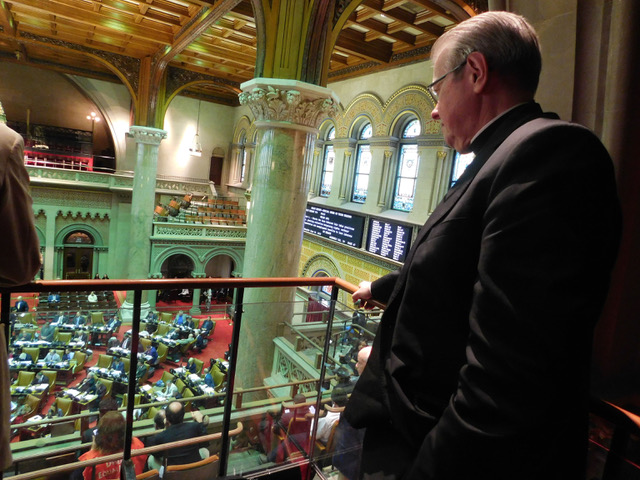2019 End-of-Session Round-Up
Published on June 24th, 2019

(Franchesca Caputo/The Evangelist)
The New York State Legislature wrapped up the 2019 session in the early morning hours of June 21. The session was among the most active in memory, as the new Democratic majority in the state Senate, joined with the Democratic Assembly majority and the Democratic Governor to take on many issues that had previously been staunchly opposed by Republicans. Below is a synopsis of major issues tracked by the Catholic Conference and their outcome.
Respect for Human Life
Physician-Assisted Suicide: In an important pro-life victory, advocates for the legalization of physician-assisted suicide failed to get a vote on the bill in any committee in either house, despite Gov. Cuomo indicating his support for the first time. The Conference, and our allies in the NY Alliance Against Assisted Suicide, were successful in highlighting the many dangerous consequences of such a policy. Interestingly, both houses passed a number of bills designed to prevent suicide for specific vulnerable populations, such as black and Latina youth, people living in rural areas, veterans, etc.
Reproductive Health Act: Tragically, early in session, the late-term abortion expansion act pushed for several years by Gov. Andrew Cuomo, passed both houses on January 22 and was signed into law the same day, becoming the most permissive abortion law in the country at the time. More than 20,000 New Yorkers have signed a petition to repeal the law.
Pro-Life Pregnancy Centers: Several bills that threatened the free speech rights of pro-life pregnancy centers advanced out of committees this session, but ultimately did not receive a floor vote in either house.
Dignity of Women and Children
Commercial Gestational Surrogacy: A repeal of New York’s ban on paid surrogacy passed the state Senate, but failed to get a vote in the Assembly. The Conference, as well as many feminist organizations, expressed grave concerns that the legislation would exploit women’s bodies and commodify children. In announcing that the Assembly would not vote on the measure, Speaker Carl Heastie said a majority of the Democratic women in the Assembly expressed concerns about the potential exploitation of women.
Legalization of Prostitution: A bill that would completely decriminalize “sex work” was introduced late in session in both houses. The Conference strongly opposes this bill, which would dehumanize and exploit women and legitimize the work of pimps and human traffickers. Feminist groups also expressed serious concerns. No action was taken on the bill, but supporters of the legislation have vowed to continue to build momentum to make New York the first state to completely legalize prostitution statewide.
Support for Immigrants and Marginalized
DREAM Act: The Catholic Conference has long supported this legislation to enable undocumented people who were brought to America as children and have been productive, law-abiding members of society, to access certain state financial aid to enable them to attend college. Early in the legislative session, the legislature passed the bill and the governor signed it into law.
Farmworkers Fair Labor Practices Act: Just before the end of session, the legislature passed a bill long supported by the Catholic Conference to guarantee to farmworkers many of the rights enjoyed by every other sector of the workforce, including the right to collectively bargain, workers compensation and unemployment insurance, a day of rest every week, housing that conforms to the sanitary code, and overtime pay after 60 hours.
Education
Substantial Equivalency Guidelines: Late last year, the state Department of Education (SED) issued “guidelines” requiring public school districts to make site visits to most religious and independent schools to determine if their instruction was substantially equivalent to that of public schools, as is required by state law. Rather than address specific concerns that have been raised about a limited number of non-Catholic religious schools that might be shown to have deficiencies, SED chose to require all religious and independent schools to be evaluated by public schools on an on-going basis, putting public schools in a position to determine whether religious and independent schools in their districts could continue to operate. The Catholic school superintendents are happy to demonstrate the academic rigor of our schools as being equivalent or superior to public schools, but believe putting this task on our competitors is inappropriate and unnecessary. Lawsuits filed by Catholic, Jewish, and other schools were successful in having the guidelines thrown out, but now SED has introduced essentially the same rules in the form of regulations, which are currently in a public comment period. The Conference is working with the Board of Regents and is also pursuing a long-term legislative solution to the matter.
Child Protection
Child Victim’s Act: This act passed the legislature in late January and was signed by the governor. It extends the civil statute of limitations for child sexual abuse to the victim’s age 55, and the criminal statute of limitations to the victim’s age 28. Further, it creates a one-year “window” where survivors can bring claims for old time-barred cases no matter how long ago. The Conference, which had long opposed the bill, removed opposition when legislators amended it to include survivors of abuse in public institutions. Previously, as we pointed out for many years, public schools and municipalities were shielded from the retroactive window due to a loophole in existing law. The Conference called on the legislature to completely eliminate the criminal statute of limitations and provide an opportunity for mediation to those who preferred it over litigation. The sponsors declined at the time, but legislation was taken up later in session to significantly extend criminal statutes of limitations for many sex crimes, including against minors.
Erin’s Law: On the last night of the legislative session, New York became the 37th state to pass Erin’s Law, which mandates age-appropriate curricula in grades K-8, which helps children, school staff and parents to spot grooming and other behaviors that may lead to abuse, and educates them on how to avoid and report abuse or potential abuse. The Catholic Conference strongly supported this legislation.
Background Check Fee Increase: Hidden away in state budget, which passed earlier this session, was an increase in the state fee for employee criminal background checks, bringing the total cost from $65 per employee to $95. The state should be promoting policies to encourage more businesses and not-for-profits to perform background checks. This will have the opposite effect, potentially at the expense of children. The Catholic Conference asks the state to revisit this issue in the next session and to pass legislation to reimburse not-for-profits for criminal background checks aimed at preventing child sexual abuse and other crimes.
Other
Marijuana Legalization: Gov. Cuomo came out strongly in favor of legalization of recreational marijuana this session, after years of holding the opposite viewpoint. The Catholic Conference released a statement in March opposing legalization. Fortunately, the measure was not passed this session. The legislature did, however, pass legislation effectively decriminalizing possession and expunging criminal records for low-level marijuana convictions.
